Peach perfection
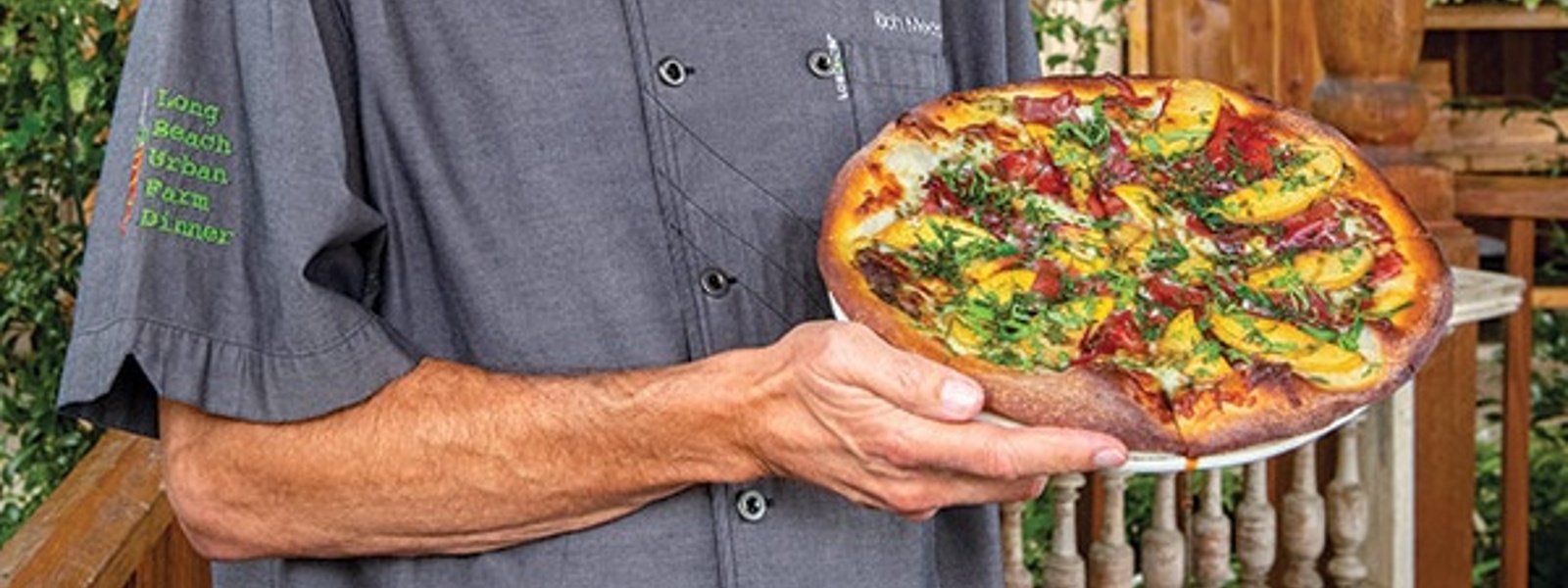
Summer 2024 California Bountiful magazine
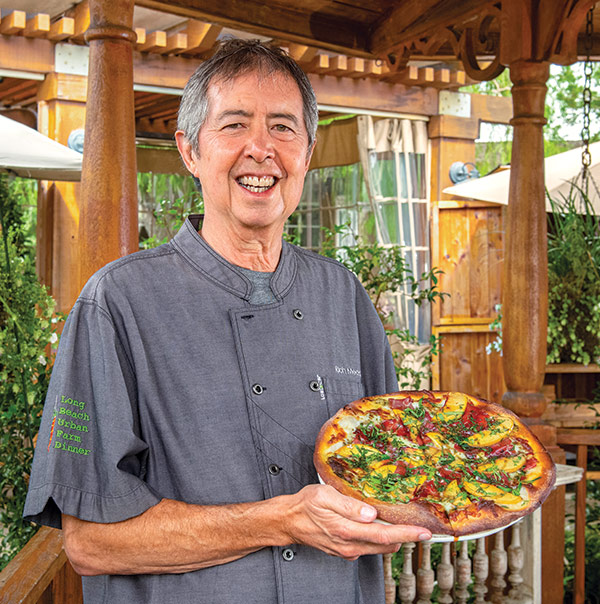
Nicholas Koon
Local chefs and households nationwide savor family farm’s fruit
Story by Linda DuBois
Chef photos by Nicholas Koon
Farm photos by Bryan Meyer
As summer approaches, chef Rich Mead can count on multiple diners at his Corona Del Mar restaurant asking, “When are you going to have the peach pizza?”
They’re talking about the prosciutto and peach pizza with pesto, mozzarella and fontina cheese, one of the most anticipated seasonal dishes at Farmhouse at Roger’s Gardens, Mead’s outdoor restaurant at the back of a 7-acre nursery.
“The saltiness and the fat of the prosciutto play off the sweetness and slight acidity of the peaches,” Mead says.
The chef is passionate about incorporating local, seasonal ingredients into his menus, and California-grown peaches are among his favorites, both for sweet and savory dishes.
He uses them in pork tenderloin, vegetable plates, salads, French toast and cocktails, and he makes a decadent peach crisp. Sometimes he dehydrates or pickles them for a culinary twist.
Mead has had a lot of time to experiment with ingredients. The Washington, D.C., native’s restaurant experience began at age 15, interrupted only by a brief government job after college graduation. That ended when an adventurous spirit drew him west, where he cooked for and eventually owned several restaurants, including Farmhouse, which he opened in 2016.
In the early 1990s, he started regularly visiting farmers markets and discovered the advantages of purchasing fresh produce directly from growers.
“I found that the flavors and the textures were so much more vivid than what I’d been getting from the produce companies,” he says.
Plus, he enjoyed making friends with the growers and began planning his menus around their future harvests.
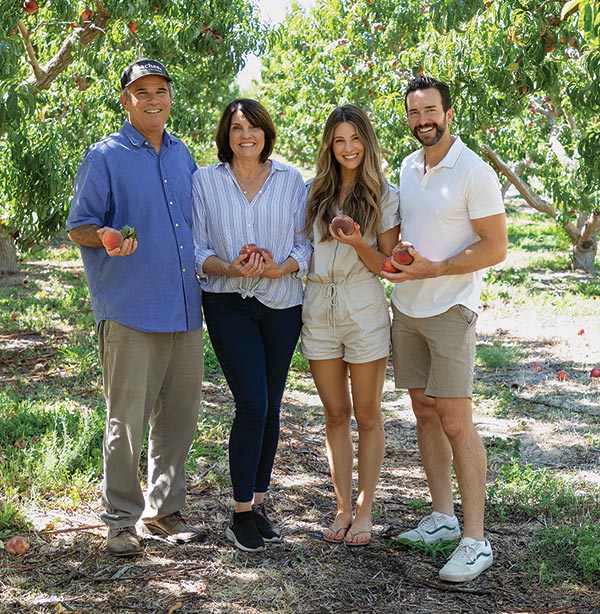
Orchard in Los Angeles County. Photo: © 2024 Bryan Meyer
Friendly partnership
Among his farmer friends are the Tenerellis, who own a fruit orchard in the Los Angeles County community of Littlerock. Mead regularly buys the family’s stone fruit, including several of his favorite peach varieties.
“I think their flavors are wonderful and they’re consistent also,” Mead says.
Peter Tenerelli, who immigrated to California from Italy in 1932, started Tenerelli Orchards in 1975 following his retirement. Today it is run by his son John and his family.
They grow several crops, such as nectarines, plums, apricots, cherries, pluots and mulberries, but about 25 varieties of peaches fill 60% of the 30 acres they’re currently farming, says John’s wife, Tracie Tenerelli.
During peak season, they sell fruit to 30 to 40 restaurants and at 25 farmers markets per week.
Sitting at about 3,500 feet, the farm’s high-desert climate is perfect for growing peaches, she adds. The trees thrive in the hot summers and frosty winters, and the dry soil curbs the risk of common fruit-tree fungal diseases.
From about the end of June through mid-October, they handpick peaches and box them in-house for shipping, transport to farmers markets or pick-up.
Between seasons, they prune the trees, maintain the water emitters, mow the weeds and sometimes take out trees or plant new ones.
Challenges include mites when dust is stirred up or peach twig borer during moist conditions. “But the biggest challenge is the weather,” Tracie says, noting it’s becoming more unpredictable. Especially damaging is frost or heavy rain late in the season, which can destroy a crop.
Besides pitching in at the farmers markets, each Tenerelli family member has specific roles in the business. John handles overall management and contributes to the hands-on farm labor. Tracie is the bookkeeper and helps pack fruit for
Peaches.LA, a supplementary business run by their daughter Natalie Tenerelli and her husband Dan Cox, which ships peaches to online customers. John’s sister Andrea Tenerelli runs and publicizes the weekend farmers markets, with help from Tracie’s son Coby Nissen. And some longtime employees are like family.
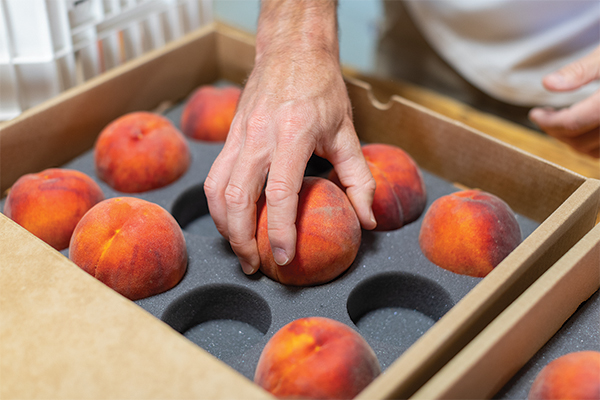
Pandemic pivot
Until 2020, Natalie Tenerelli and Cox weren’t too involved with her parents’ farm. But when restaurants and farmers markets shut down during the pandemic, they wanted to do something to help keep the family business afloat.
“We told John, if you grow the fruit for us, we’ll market it online and figure out a way to sell it directly to consumers,” Cox recalls.
With no money for advertising, Natalie took to social media and found a network of friends and pre-pandemic customers willing to help spread the word about the farm’s peaches.
They called the venture Peaches.LA and created its website, and online sales soon took off.
“It became this really special thing to people during COVID,” Cox says. “When they didn’t have everything else—going to restaurants or doing activities—getting a box of unbelievable fresh fruit on their doorstep was such a treat.”
Yet, even now, sales continue to grow. Customers come from every U.S. state, ranging from celebrities and sports stars to everyday families willing to pay a premium for tree-ripened freshness and home delivery.
The founder of a nutrition-product business, Cox is accustomed to selling packaged goods online, but he’s found that shipping perishable fresh fruit has unique challenges.
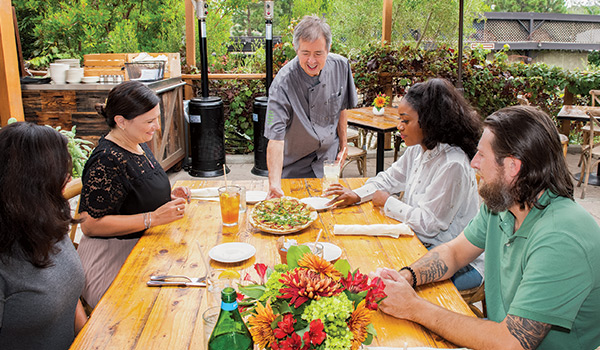
“All the fruit is perfect to eat, but when you ship it, 24 hours of rubbing against the foam in the box can exacerbate any kind of imperfection on the skin or even the slightest bruising that you wouldn’t even notice. So, we have to pick the top 10% of the most perfect pieces of fruit to ship out. It’s pretty labor intensive from that standpoint,” Cox says.
“It would be very easy for us to pick early and put unripe fruit in the box. But we refuse to do that. The fruit develops so much flavor in those last couple of days (on the tree). We want people to be able to open up the box when it arrives and pull a peach out and bite right into it either that day or the next day.”
Each week, crew members have a routine they follow. “We take orders all week, print out the labels on Sunday nights and then pick, pack and ship on Mondays,” Cox says. Californians get the box of 12 peaches the next day and the other states’ residents in two days.
Buying fruit from Peaches.LA “is not cheap,” Cox says, “but once people try our peaches, there’s no going back. They want more.”
Yellow or white peaches? It depends
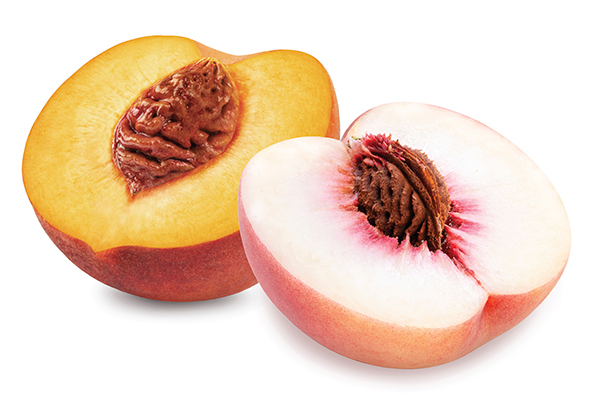
There are hundreds of different varieties of peaches. Some are freestones, handy to cook with since the fruit easily pulls away from the pit, and some are clingstones, better for eating fresh since the flesh sticks to the pit.
But it’s the color of the flesh that makes a significant difference in flavor. White peaches have a delicate, floral sweetness, and yellow peaches’ acidity gives them a more intense flavor.
Tracie Tenerelli, whose family grows all types of peaches, says there’s a clear winner among the farm’s customers.
“I would say in the farmers market, probably 75% of the people prefer yellow peaches,” she says. “The restaurants are really partial to the yellow fruit too.”
She agrees with them. “White peaches, to me, are just sweet. They don’t have that real peachy flavor.”
One of the farm’s most popular yellow varieties is the mid-season O’Henry. “We also have one called the Summer Lady that comes right along with that. Some of our guys nicknamed it Sangre de Toro—blood of the bull—because it has so much red juice. I used to be partial to the O’Henry, but Summer Lady, to me, has the most flavor to it,” she says.
Rich Mead, chef and owner of Farmhouse at Roger’s Gardens in Corona Del Mar, says both white and yellow peaches are special for different reasons.
Yellow peaches, with their more pronounced flavor, are more versatile, he says. “I prefer a high-acid sweetness because when you bake and cook with it, it turns out nicely,” he says.
“But we use the white peaches too,” he says. He’s noticed that certain ethnic cultures prefer white peaches, and their milder flavor adds the perfect subtle sweet accent to some dishes, especially salads.

